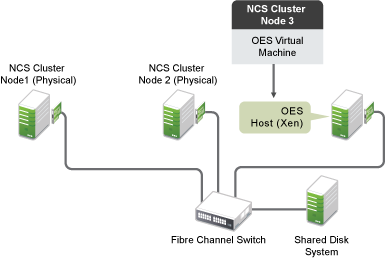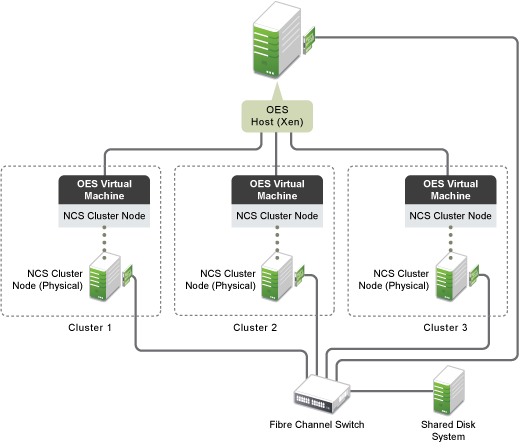14.5 Mixed Physical and Virtual Node Clusters
This is a temporary scenario that is used for upgrading cluster nodes or converting clusters from physical to virtual cluster nodes.
This can be done through several different methods. One method is to add a virtual OES cluster node to an existing physical OES cluster. To do this, you install an OES and Xen server (physical machine). You then create a OES virtual machine on the physical machine and install and configure OES Cluster Services on the OES virtual machine. During the OES Cluster Services installation, you add the OES virtual cluster node to your existing OES cluster (physical nodes).
You can then migrate the desired resources from the physical cluster nodes to the virtual cluster node. This lets you offload resources from physical nodes so you can upgrade hardware and software and then replace the physical cluster nodes with virtual cluster nodes.
Figure 14-4 depicts how this setup might look.
Figure 14-4 Mixed Physical and Virtual Node Cluster

Another method is to install OES Cluster Services on physical nodes and create a separate cluster for each node. You then install an OES with Xen server (physical machine) and create OES virtual machines and install OES Cluster Services on each virtual machine. You can then add one virtual OES cluster node to each cluster to create multiple two-node clusters, each containing one physical and one virtual cluster node.
This allows you to migrate the desired resources from each physical cluster node to the virtual cluster node in the same cluster. Using this setup, you offload resources from physical nodes so you can upgrade hardware and software and then replace the physical cluster nodes in each cluster with virtual cluster nodes.
Figure 14-5 depicts how this setup might look.
Figure 14-5 Separate Mixed Physical and Virtual Node Clusters
